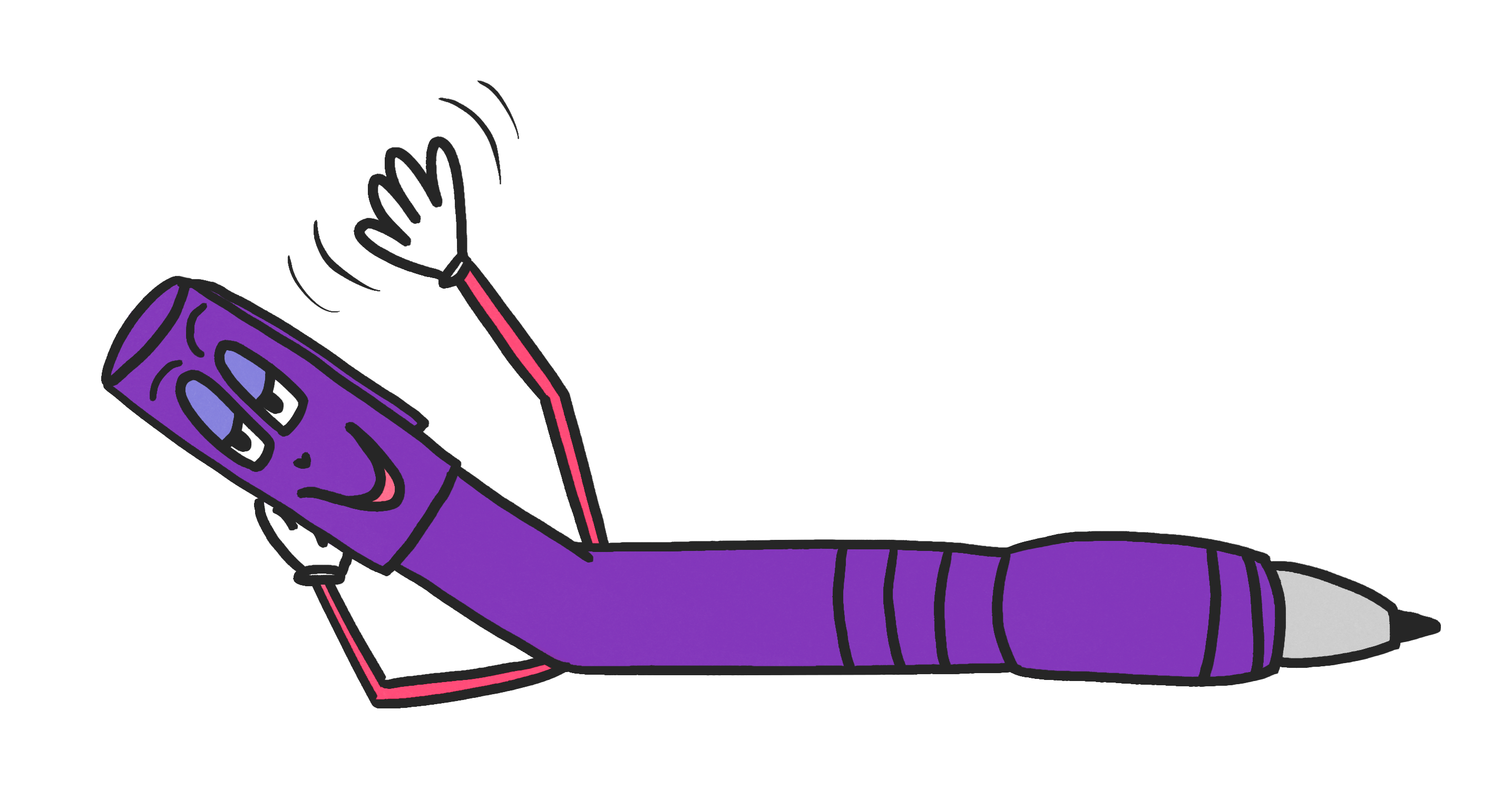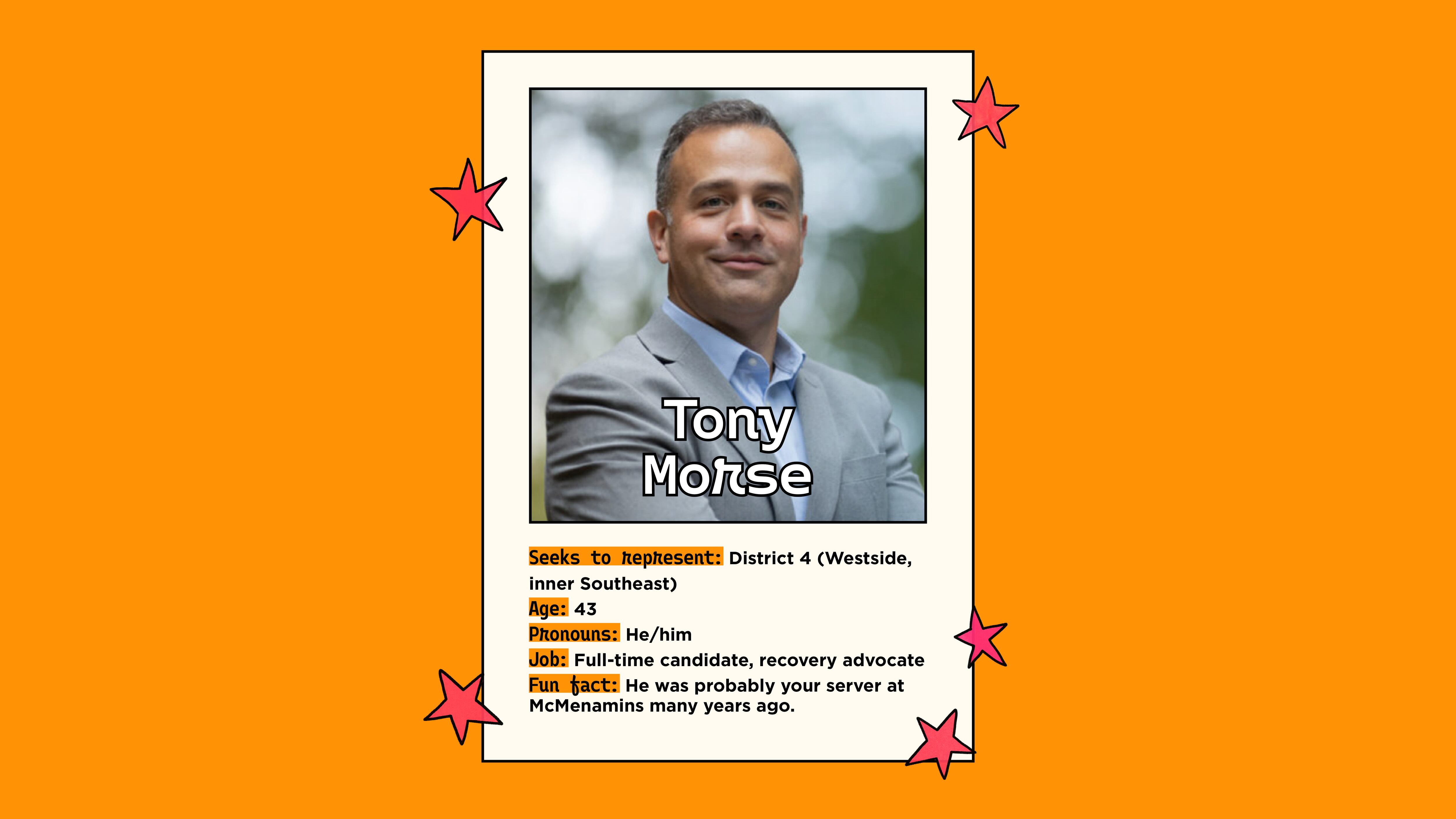Seeks to represent: District 4 (Westside, inner Southeast)
Age: 43
Pronouns: He/him
Job: Full-time candidate, recovery advocate
Fun fact: He was probably your server at McMenamins many years ago.
When he talks about what motivated him to run for City Council, Tony Morse says he often thinks back to the time he worked up the courage to ask for help with his addiction.
“The friend I called didn’t just help me, she taught me that a focus on serving others can make change and save lives,” he says. “She showed me that being of service to others builds strong recovery, and that spirit of service is what moved me to jump in this race and run for Portland City Council.”
Morse, 43, was the policy and advocacy director in 2023 for Oregon Recovers. He’s now seeking to represent District 4 and says he can be the addiction and recovery advocate his city needs to overcome an addiction crisis.
He grew up in the suburbs of Portland and attended Western Oregon University, then the New England School of Law. He’s been back in Portland since 2011, and in the past decade has worked as a realtor, a commercial litigation associate and a judicial law clerk.
Morse has received $40,000 in matching funds through the Small Donors Election program. Overall, his campaign has raised $77,000. He’s been endorsed by the Portland Firefighters Association, AFSCME Local 189 and 328, the Portland Police Association and the Northwest Oregon Labor Council. He’s also been endorsed by three sitting city commissioners: Dan Ryan, Carmen Rubio and Rene Gonzalez.
We spoke to Morse about his campaign. Questions and answers have been lightly edited for brevity and clarity.
WW: What are your top three priorities if elected?
Tony Morse: Expanding pathways to addiction recovery would be number one. Number two would be solving our housing and homelessness crisis, and number three would be strengthening public safety. It’s important to realize that Portland’s addiction crisis impacts everything from housing and homelessness to community livability and the reputation of our city. When we prioritize recovery, we can have a city that is safe, healthy and housed.
Beyond policing, what measures would you take to improve public safety in Portland neighborhoods?
We can substantially improve public safety by reducing public drug use and overdoses. Nine-one-one response times aren’t expeditious enough, in part because our first responders are overwhelmed with drug overdoses. It’s essential to recognize that strong public safety depends on a strategic relationship between law enforcement and behavioral health specialists so every Portlander can get the type of help they need and deserve. The Portland Police Bureau plays a key role, as does Portland Street Response and Project Respond. Lastly, public safety includes fire protection. I can’t emphasize this enough; we need to make sure our firefighters receive the resources and support they need to do their very important job.
How would you support local businesses and foster economic growth in Portland?
As a former small business owner, I know that running a business in Portland can be very challenging. Now is not the time to make running a business more difficult, and I support a moratorium on new taxes and fees.
What aspects of the city’s current approach to drug use and overdose deaths do you support and what would you change?
House Bill 4002 changes the city’s role significantly. I know some folks were upset about the restoration of criminal penalties for drug possession, but we can’t afford to have local elected leaders who do not understand the task and purpose of House Bill 4002 and not take it seriously. We needed this change to equip our police officers with the tools they need to intervene and better connect folks with more treatment services. We should create a coordinated Office of Addiction Response, which will combine elements of the city, the county, the state, behavioral health providers, payers and folks in recovery housing, along with others at a single table under one roof to provide a more cohesive response to this crisis.
Do you support the city staying in the Joint Office of Homeless Services? What’s your plan to address homelessness?
I do, but with a measure of accountability. If the county isn’t a good partner going forward, then the city needs to repurpose the money that’s being invested in this collaboration with respect to homelessness. Specifically, we need to increase our homeless shelter capacity and our capacity for shelter alternatives, and our shelter alternative capacity. Long term, we need to build more housing of all kinds—you don’t get to housing affordability without housing abundance. Also, there is a meaningful overlap between the addiction crisis and the homelessness crisis, and we can make impactful improvements by focusing on the support and development of recovery housing specifically.
Which current City Council member do you and your policies most align with?
In terms of style, I would say that Commissioner Ryan and I have some things in common.
How do you want police to respond to riots if Trump wins in November?
I trust the Portland police to handle whatever the situation might be in a professional manner. People have a right to peacefully protest. After Roe v. Wade was overturned, I participated in a very peaceful march protesting that decision. But criminal activity is not a form of speech, and Portlanders should be able to rely on an appropriate law enforcement response in that case.
How do you feel about the new structure of city government and ranked-choice voting?
What I like about the new system is that it is designed to be very responsive to constituent needs. I am excited about focusing on issues most important to the residents of District 4, and I would say that it’s going to require city councilors who are strong conveners and collaborators. Regarding ranked-choice voting, it’s great that voters will have an opportunity to more thoroughly express their preferences for which officials they want to elect.
See the other Portland City Council Candidates here!
 This article is part of Willamette Week’s Ballot Buddy, our special 2024 election coverage. Read more Ballot Buddy here.
This article is part of Willamette Week’s Ballot Buddy, our special 2024 election coverage. Read more Ballot Buddy here.

